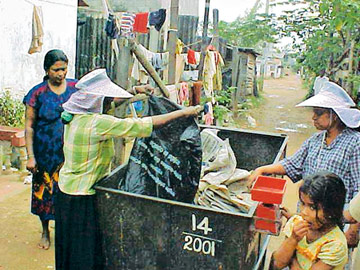Itís time we commended the paththara bothal karayas
Nilusha Lakmali Patabendi and Varuna Rathnabharathie
The vital role played by the paththara bothal karayas or waste
collectors who diligently visit homes to collect bottles, papers or
those who go through garbage to squeeze out a living should in fact be
applauded and assisted. Motivating and managing their contribution to
society would make Sri Lanka cleaner and the collectors themselves
prosperous.
The solid waste problem in Sri Lanka is becoming a major
environmental threat that affects the environment, society and economy.
Approximately 80% of municipal domestic solid waste produced in Sri
Lanka consists of organic waste, including food and garden waste and the
balance is paper, plastics, glass, metals and other inorganic materials.

These can be collected and sold which means they have great potential
to be managed through informal waste collection. Though informal solid
waste collection plays a major role in solid waste management, it has
not been yet given adequate attention in national plans and policies.
Colombo is the most affected area facing a severe crisis in respect
to the disposal of solid waste material because of rapid urbanisation,
changing lifestyles and industrial development which have increased
consumption as well as the amount of waste generated.
Year 2008 was declared the International Year of Sanitation (IYS) by
the United Nations General Assembly and improvement of informal waste
collection can contribute significantly to the objectives of the IYS.
Expansion and progress of the informal waste collection enhance the
sustainability and effectiveness of available sanitation solutions. The
result is to improve health impacts, social and cultural acceptance,
technological and institutional appropriateness, and the protection of
the environment and natural resources.
Practical Action, an international non governmental organisation, has
done a study in the Galle City about informal waste collectors very
recently, which reveals important findings.
Accumulation of waste in the environment is a global issue and some
countries have used different strategies depending on the nature of the
problem. One such example is Egypt, where the government has provided
pick up vehicles for informal waste collectors and given good social
recognition to them, which means that their work is valued and
respected.
A waste collection system may include door to door collection in
which the householder does very little with collection from a curbside
dumping place or specified collection times when the household brings
the waste to the truck.
The main benefit of informal waste collection in a city is that it
increases the frequency of collection and the number of collection
points and contributes towards the reduction of garbage dumps and
encourages reuse or recycling of waste.
Waste pickers, scavengers, informal house to house waste collectors,
middle scale waste collectors, large scale plastic polythene and paper
recyclers, and waste material exporters can be regarded as actors in the
informal waste collection chain.
Waste material can be degradable or non degradable and can be further
divided in to compostables, recyclables and disposables.
Plastic, paper, cardboard, glass and metal are common waste material
that are collected and sold for recycling or reuse in Sri Lanka. There
are about 20-30 waste items that are collect by informal waste
collectors from households, shops, and private and governmental offices.
Usually the informal waste collecting sector is neglected by planners
and policy makers. This lack of organisation and acknowledgement of the
waste collectors gives rise to certain problems like conflicts between
collectors and mudalalees.
It also means that some areas may not be covered and there are
insufficient storage and transport facilities. Inefficient modes of
transportation (bicycles, carts and walking) used in informal waste
collection are time consuming and labour intensive.
The areas usually neglected are poor communities because they do not
generate the type of waste that collectors can profit from such as
plastics, glass bottles and paper.
This also means that dirty or rotting waste, which has no value, will
not be collected, and if this is mixed with items that can be recycled
they too may be left because the time spent washing them reduces profit.
Informal waste collection plays a very important role the in keeping
the city clean but it could be greatly improved by recognising the
activity and integrating it into the formal waste collection system.
Networking of informal waste collectors within the sector and with
householders, communities, shops and other institutes at the grass root
level could be more beneficial for better coordination and
sustainability.
It is also necessary to support the existing activities that are
taking place and to do this the informal sector must be linked into a
value addition chain.
Initial processing activities such as cutting, chopping, shredding,
washing, cleaning and sorting must be encouraged to produce greater
profits. Furthermore, if informal waste collectors were paid in some way
to collect non-reusable waste this would have a major impact on the
citiesí streets where garbage often accumulates for weeks.
If informal collectors were acknowledged and respected for their
role, and given additional support, such as more options for recycling
or waste collection equipment, and transportation they could be even
more efficient. Bicycles and carts could be adopted to enhance
efficiency of informal waste collection service.
Informal waste collectors in the waste collection chain are
influential and isolated group that need more attention and focus
towards better functionality and flow of the informal waste collection
chain.
Understanding of social and economical issues and problems of
informal waste collectors in the sector will be able to bring up their
service more valuable and fruitful. |





